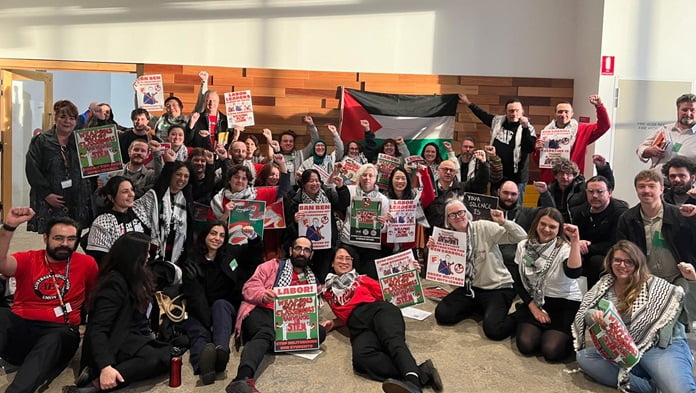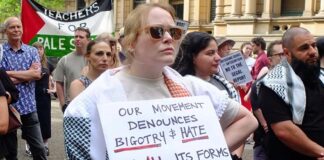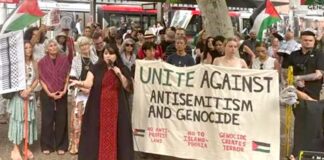Members of Teachers and School Staff for Palestine made a big impact as the Australian Education Union conference in Melbourne took significant steps in solidarity with Palestine.
More than 30 TSS4P members, backed by many other delegates who strongly supported Palestine, helped turn the AEU conference into a Palestine conference.
Two resolutions were passed with overwhelming support; one proposed by TSS4P and the other by AEU officials.
The officials’ motion demanded, “An end to the occupation of Palestine and a just and sustainable peace in accordance with UN Security Council resolutions. Ending the occupation must include the removal of illegal settlements, the withdrawal of Israel from all Palestinian lands along with the dismantling of the separation wall.”
Delegates amended the officials’ resolution to commit the AEU to mobilising for a Palestine solidarity rally in the city once a month.
Delegates and officials used material from TSS4P’s “Weapons out of classrooms” material when speaking to the motions, which condemned the militarisation of schools and the AUKUS security pact.
One issue that generated debate was the call for a “two state solution”, which TSS4P members argued should be deleted from the official motion.
The amendment lost but the debate was useful, drawing out questions about Israeli apartheid, the fundamentally discriminatory and exclusive nature of Israel and the extent of global struggle for Palestine that makes a one state solution possible.
The TSS4P motion condemned Federal and Victorian government ties with Israel and called on the Victorian Government to break the 2022 Memorandum of Understanding with the Israeli Defence Force, demanding that it end co-operation and investments with Israeli weapons companies.
It raised concerns with the use of the IHRA definition of antisemitism and the “unnecessary and unlawful” scrutiny of staff and students “who elevate Palestinian human rights by wearing keffiyeh and Palestinian symbols at school, or who advance views to support those Palestinian rights with students”.
One TSS4P activist told Solidarity, “Our motion passed unanimously, with a lot of enthusiasm for people going back to schools and regions, feeling very confident about being a visible part of the movement.
“There was a big buzz, and delegates felt genuinely proud to be part of such an important global struggle.
“It was a real successful culmination of a huge collective struggle—both ourselves and across the movement. It was a feat of non-sectarian collaboration of activists from across the left.”
A feat of rank-and-file activism
Teachers and School Staff for Palestine did not wait for Australian Education Union official endorsement to take action.
From organising and defending workers wearing keffiyehs at school, to creating and defending radical teaching material such as Teaching for Palestine: Challenging ANZAC Day, to confrontations with Ben Carroll, the Minister of Education and key facilitator of Israeli war companies setting up factories in the state, rank-and-file members have organised relentlessly without any official AEU Victoria Branch support.
But recognising that our capacity to escalate action and broaden the movement would depend on our ability to reach more people and build greater participation in defiant action, TSS4P worked at building up union support for Palestine action in sub branches and union regions.
Many TSS4P members set up or revived school sub branches or became union representatives so that they could build Palestine solidarity at work. By the end of Term 1, at least eight regions representing thousands of members had passed pro-Palestine motions, often with union officials as the single vote in the room against.
TSS4P developed a booklet explaining and arguing for our motion which we took to our regional meetings and sent to every conference delegate and union official. We also held a pre-conference forum with speakers from APAN, Labor Friends of Palestine, and the Jewish Council of Australia to build the case for our motion, and the campaigning that must follow.
We created a contagious atmosphere on the day of the conference, preparing interventions collectively, and coming armed with ma’amoul, zaatar, keffiyeh, and stickers inviting others to “ask me about my keffiyeh”.
We put all of our teaching and organising resources on display and talked to as many other delegates as possible about our campaign. We wanted to make sure every delegate felt strong, clear and united in our resolution to end the Victorian and Federal government’s support for Israel’s violence.
TSS4P members will now use the official support from the conference to increase the mobilisations and build pressure on the Victorian and Federal governments to cut their ties with Israel.
By Lucy Honan






